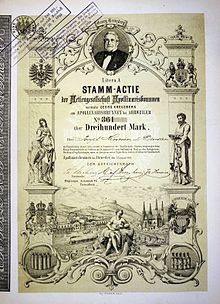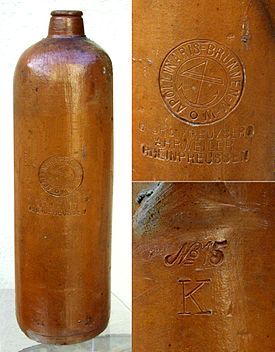Apollinaris (mineral water)
| Apollinaris
|
|
|---|---|
| legal form | GmbH |
| founding | 1852 |
| resolution | April 28, 2010 |
| Reason for dissolution | Merger with Coca-Cola Erfrischungsgetränke AG, Berlin |
| Seat | Bad Neuenahr-Ahrweiler |
| management | Georg Gocke |
| Number of employees | 450 |
| sales | 81 million euros (2006) |
| Branch | Beverage manufacturer |
| Website | apollinaris.de |
Apollinaris is a mineral water brand owned by the US beverage group The Coca-Cola Company .
history
The beginning
The winemaker Georg Kreuzberg bought a vineyard near Bad Neuenahr in the 19th century . However, when the wine did not want to thrive on this mountain, he carried out test drillings and found carbonated water at a depth of 15 meters in 1852 . The high CO 2 concentration in the soil was the reason for the poor growth of his vines. Kreuzberg named the spring after Saint Apollinaris of Ravenna - the patron saint of wine, because the vineyard is on the pilgrimage route to the head of the saint on the Remagener Apollinarisberg and at the foot of the vineyard there was a pilgrimage rest and a saint's house with an Apollinaris figure. That was the beginning of the use of the Apollinaris spring . When Kreuzberg died in 1873, his heirs founded the joint stock company Apollinarisbrunnen, formerly Georg Kreuzberg , which acquired the nearby Heppinger Brunnen in 1885 . The Heppinger medicinal water is sold as an independent brand to this day.
In 1895 Apollinaris registered the red triangle - the symbol was used to distinguish particularly good products in Great Britain - and the slogan The Queen of Table Waters as a trademark . In 1897 the company was sold to the London hotel group Frederick Gordon and incorporated into the holding company Apollinaris and Johannis Ltd. London incorporated.
In 1913 Apollinaris reached an annual filling of 40 million bottles. 90% of the production was exported to all regions of the world by sea .
In National Socialism
The SS had through acquisitions Sudeten German and Czech mineral water in the bottled water industry is a monopoly achieved what they sought further round by taking over other sources. Heinrich Himmler, chief of the SS, was considered a pronounced mineral water drinker.
The Rheinahr glass factory, founded in 1907 between Sinzig and Niederbreisig , belonged to the Apollinari group . With a takeover of the Apollinaris group, the SS also combined the intention of "breaking the (...) excessive prices of the syndicate producing mineral water bottles".
As an English enemy, Apollinaris came under fiduciary administration in 1939 after the beginning of World War II and was confiscated on March 3, 1941 for alleged anti-subversive attitudes. The assets of Apollinaris-Brunnen AG were confiscated on April 2, 1942 in favor of the German Reich . Finally, on October 10, 1943, a lease agreement was signed between Apollinaris-Brunnen AG and the newly founded Apollinaris Betriebe GmbH owned by the SS.
Forced laborers were used both in the well operation and in the glass factory .
Due to the war, production in both plants ended in early October 1944.
After the Second World War
After Schweppes Ltd. the company had acquired, the resale of all shares to the Dortmunder Union - Schultheiß Brauerei AG followed in 1956 . In 1991 a joint venture with the German Schweppes GmbH was founded. The new company traded as Apollinaris & Schweppes GmbH . In 2002 Cadbury Schweppes took over all shares.
In 2006 the company was sold to Blackstone and Lion Capital and in the same year Coca-Cola acquired the company. The trademark rights to the Schweppes products were sold to the Krombacher brewery . Production is still carried out by Apollinaris Brands GmbH, based in Berlin. This is a subsidiary of the Coca-Cola Group represented in Germany by Coca-Cola Erfrischungsgetränke AG.
With its springs in Bad Neuenahr-Ahrweiler , an annual sales volume of more than 750 million liters is achieved. The annual average is dispatched with 150 trucks on working days.
In January 2013 it was announced that sales outside Germany had been discontinued at the end of 2012. This decision by Coca-Cola Germany was taken in 2011. The international sales contacts listed to date (2016) contradict this message. In the July 2019 edition, the ÖKO-TEST magazine rated the Apollinaris Classic mineral water as the only one of 53 mineral waters tested as unsatisfactory. The boron and arsenic levels were particularly high. In the next mineral water test of the magazine ÖKO-TEST in the June 2020 issue, in which mineral water with a medium carbonic acid content was tested this time, the mineral water Apollinaris Medium was the only product tested that received the grade unsatisfactory .
Chemical composition
Apollinaris is a natural mineral water and is not table water made from tap water , e.g. B. Bonaqa . Apollinaris is obtained from two sources and bottled there, with the exception of carbon dioxide , without any further changes.
| material | Amount in mg / l |
|---|---|
| potassium | 30 (29) |
| sodium | 480 (480) |
| Calcium | 90 (88) |
| magnesium | 120 (124) |
| Bicarbonate | 1800 (1861) |
| sulfate | 100 (102) |
| chloride | 130 (128) |
(Values in brackets Stiftung Warentest 8/2011 for Apollinaris classic)
Characteristic is the high content of sodium ions, which exceeds that of various low-sodium mineral waters by 40 to 50 times. Anyone used to low-sodium mineral water will find the taste of Apollinaris comparatively salty.
Extraction point (for local population)
At the Heppinger Brunnen and in the city center of Bad Neuenahr there is the possibility of bottling Apollinaris spring water unprocessed.
The water in its unprocessed form, which can be taken directly from the spring, is characterized by its natural carbonic acid and its "iron-containing" taste, which is typical for a thermal spring. A few hours to a few days after filling, the water turns rusty brown due to the iron content and the iron contained in the water begins to accumulate on the surface of the container.
Thermal springs such as the Apollinaris spring are common in the vicinity of the Vulkaneifel.
ViO
The ViO mineral water brand was launched in May 2007 as a 0.5 liter bottle for the “on the go” market segment. The trademark was registered in Germany in 2003 as a word mark for The Coca-Cola Company , and in 2007 the trademark was transferred to Apollinaris GmbH .
Web links
Individual evidence
- ↑ History of Apollinaris ( Memento from September 4, 2011 in the Internet Archive ) on "rotweinwanderweg.de" (historical data of the Apollinaris Brunnen Actiengesellschaft Bad Neuenahr Ahrweiler 1852)
- ↑ a b c d e Ahrweiler district under the swastika . The political and economic situation before 1933. The National Socialist dictatorship 1933 to 1945. The political consequences after the collapse in 1945. In: Kreis Ahrweiler (Ed.): Studies on the past and the present . tape 2 . Warlich Druck und Verlag GmbH. Meckenheim, Bad Neuenahr-Ahrweiler 1989.
- ↑ Rainer Kresse: Shards save money . In: Ahrweiler district (ed.): Heimatjahrbuch 1983 . Bad Neuenahr-Ahrweiler, p. 31 ( digitized edition in the Heimatjahrbucharchiv of the Ahrweiler district [accessed on November 9, 2016]).
- ↑ Pepper from Dachau . In: Der Spiegel . No. 52 , 1963, pp. 30 ( online ).
- ↑ a b Apollinaris drinks industry from Berlin in the company database wirdzu-wem.de. who-to-whom, accessed November 11, 2016 .
- ↑ Coca-Cola buys Apollinaris, Krombacher takes over Schweppes rights. Matthaes Verlag GmbH, Stuttgart, accessed on November 11, 2016 .
- ^ A b Apollinaris mineral water - The Queen of Table Waters. Apollinaris Brands GmbH, accessed on November 11, 2016 .
- ↑ Frieder Bluhm: Apollinaris stops worldwide sales of table water. In: Rhein-Zeitung. January 7, 2013, accessed May 5, 2015 .
- ↑ Mineral water test: every third brand burdened (accessed on July 5, 2019)
- ↑ ÖKO-TEST June 2020 edition, pages 28–42, here page 42





